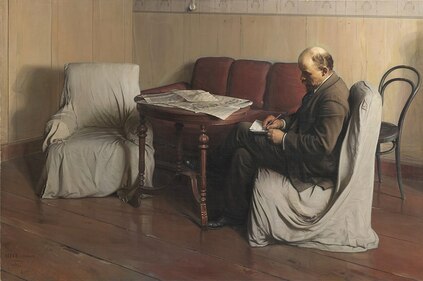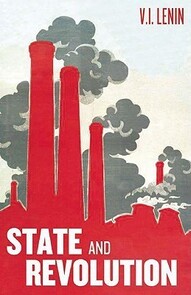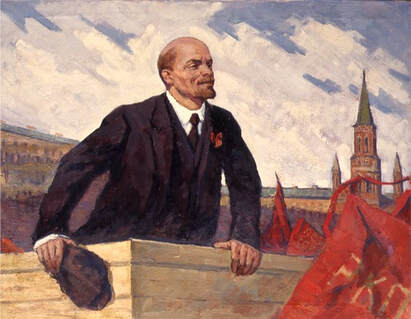|
7/21/2021 V. I. Lenin: State and Revolution — Commentary and Analysis. (11/12) By: Thomas RigginsRead NowChapter 5 of State and RevolutionChapter 5 of State and Revolution has a brief introduction and four sections. Part Three of this review covers section four. 4. Higher Phase of Communist Society This is a very important section and should dispel many incorrect notions about the nature of socialism, the level of development towards communism in the former and current socialist states, and the possibility of creating any kind of society that brings freedom and justice to humanity as long as capitalism exists and a state is necessary to regulate social life. This section is an extended commentary by Lenin on the following quote from Marx’s Critique of the Gotha Programme: “In the higher phase of Communist society, when the enslaving subordination of individuals in the division of labour has disappeared, and with it also the antagonism between mental and physical labour; when labour has become not only a means of living, but itself the first necessity of life; when, along with the all-round development of individuals, the productive forces too have grown, and all the springs of social wealth are flowing more freely— it is only at that stage that it will be possible to pass completely beyond the narrow horizon of bourgeois rights, and for society to inscribe on its banners: from each according to his ability; to each according to his needs.” Lenin says that in light of this quote we can understand why Engels mocked those who conjoined the notions of “freedom” and “state.” Lenin frankly remarks that: “While the state exists there is no freedom.” There can only be relative degrees of repression. Today we are faced with the issue of increasing inequality between the citizens in the various states that presently exist on the world stage. A recent book by Thomas Piketty (Capital in the 21st Century) has brought this issue to the forefront of political discussion. But nowhere in his discussion does he deal with one of the major causes of social inequality. This is, Lenin points out “the antagonism between mental and physical labour” which is “one of the principal sources of modern SOCIAL inequality.” Under capitalism, as a matter of fact, inequality can never be eliminated. Some will always be “more equal than others.” This is because under capitalism the division of labor cannot be abolished. Nor can it be removed simply by eliminating the capitalists. It is “impossible to remove immediately by the mere conversion of the means of production into public property, by the mere expropriation of the capitalists.” No one should be surprised that social inequality existed in the former socialist states and still exists in countries today calling themselves socialist. These states only provided or still provide the foundations for the possible future social conditions whereby this division could be eliminated. The development of industrial technique must attain a level where a super abundance of social wealth will be available for social distribution and universal education will eliminate the separation between physical and mental labor and the inequality that it breeds. Capitalism retards this growth in technique but the elimination of capitalism presents the possibility for its growth. How this future possibility will eventually present itself and exactly when such industrial growth will ever become so developed that all human beings can equally share in its benefits, Lenin informs us “we do not and cannot know.” But we do know there will be no “withering away of the state” before this time comes. One of the points of this for us is that all criticism of socialist states, past and present, for not bringing about some sort of equalitarian worker’s paradise is based on ignorance of the actual social realities the founders of Marxism discussed concerning the prospects of a future communist society. Lenin points out that those bourgeois critics of socialism who sneer at its claims of liberation and label as Utopian dreams the ideals of a society of complete social equality in which people create social wealth according to their abilities and share it according to needs only display “their ignorance and their-self seeking defense of capitalism.” Lenin calls them ignorant because while this highest stage of Communism has been discussed by the founders of Marxism as a theoretical possibility “it has never entered the head of any Socialist to ‘promise’ that the highest phase of Communism will arrive.” This phase would require people quite unlike the common run of humanity today— people raised and educated to share and live lives of unselfish devotion to their common humanity as well as developing their individual talents and abilities with no desires to do so at the expense of other human beings. They would be living in a society capable of producing and sharing social wealth unlike any society of the past or present. Foreseeing this possibility is not the same as “promising” it will ever come about but it is a possible future to keep in mind and for which we can strive. Until that day comes, when the state as we know it has “withered away,” Lenin says that “Socialists demand the strictest control, by society and by the state, of the quantity of labour and the quantity of consumption.” But this control has to begin not in the present society but with the overthrow of capitalism and the capitalist state— “a state of bureaucrats”— and its replacement by “a state of armed workers” (the Second Amendment will have some use after all). Lenin has in mind soviets of workers and soldiers as they appeared in Russia in 1905 and 1917. He thought of these soviets as models of real democracy (and, by a dialectical inversion, as a “democratic dictatorship”— a term which confounds many socialists today who have forgotten what is “dialectical” in dialectical materialism). This new post-capitalist state will turn all the citizens into workers of one gigantic syndicate or monopoly — “the whole state” — controlled and governed by the workers themselves by means of the soviets. The reality, however, turned out differently from Lenin’s ideas expressed here in chapter five. No actually existing socialist state was ever capable of existing as a state based on the “armed workers” and they all ended up with professional standing armies and administered by bureaucrats. These states were handicapped by developing in industrial backwards, or devastated, areas and were never able to create enough social wealth to advance beyond the most rudimentary socialist beginnings even though they brought about giant leaps forward in education, economic and social well being, literacy, and health to the populations living in them. The surviving socialist states are still grappling with many of these problems while simultaneously furthering the well being of their citizens. Lenin wants to be clear on the scientific difference between Socialism and Communism. Socialism is the first and lower phase of Communism-- but it is not full Communism. Socialism has succeeded in turning the means of production, formerly owned and controlled by capitalists, into socially owned public property. This is technically "Communism" but it is not completely evolved mature Communism, hence this lower phase is best dubbed Socialism and the term "Communism" reserved for the more advanced and higher phase into which Socialism will hopefully evolve. Marx, basing himself on materialist dialectics, sees Communism evolving out of capitalism via Socialism. The Socialist stage still has many capitalist "taints" associated with it and retains, in Marx's words, "the narrow horizon of bourgeois rights." Bourgeois rights still predominate in the creation and distribution of wealth-- goods and services are dished out, in the main, to each according to his/her work. There must still be a state apparatus to ensure that rights are preserved and recognized. In the beginning of the establishment of Socialism then the new state will be charged with defending bourgeois rights-- it will be, in fact, a bourgeois state administered by workers. Lenin puts it this way, "for a certain time not only bourgeois rights but even the bourgeois state remains under Communism [i.e., the first phase--tr], without the bourgeoisie!" Capitalism without the capitalists!-- or least without them in control. There are "socialist" countries today still evolving along these lines. The former East European socialist states and the Soviet Union were at this stage when they imploded. Lenin says this view of a bourgeois state without the bourgeoisie may look like a paradox but Marx held that it was inevitable “in a society issuing from the womb of capitalism.” Nevertheless, democracy is absolutely necessary for the working class but it is only a stage along the road from feudalism to capitalism and on to Communism. Democracy is seen by the workers as leading to equality and ''equality'' is “a useful slogan” as long as we remember that we mean by it “the abolition of classes.” But we get only formal, not real equality under democracy. We get real equality only under Communism when distribution is ruled by needs not work. Lenin admits that“we do not and cannot know” how Socialism will transform itself into this future higher state but it will come after the workers have smashed to bits the current form of the bourgeois state and substituted a higher form of state (still a state) based on a people’s militia of “universal participation.” None of the former, or current, socialist countries opted for states based on a people’s militia of “universal participation.” At this stage quantitative changes will lead to qualitative changes. By this Lenin means that the vast numbers of the formerly oppressed are now directly involved in ruling and administering the economy and the state and this changes the way democracy functions— no longer a tool of the bourgeoisie to control the people but a tool used by the people to take charge of their own lives. The recent elections in the United States, leaving control of the Senate to the right wing reactionary Republican party, serves as a reminder of how democracy serves as a tool of the bourgeoisie (not that a Senate Democratic victory would have changed this relationship but it would have appeared less sharply). All this depends on the advanced stage that capitalism has reached where universal literacy has been attained (“already realised in most of the advanced capitalist countries”) and the workers have been “trained” in how to operate the vast complexities of the capitalist industries and factories already “socialised” but presently still owned by the capitalist class. The specialized workers—i.e., trained economists, agronomists, scientists and engineers will, Lenin says, work “even better” for the workers than for the capitalists. I am not so sure how the “specialists” would have reacted to getting “equal” pay with the workers under the new system as Lenin says everyone will be a state employee all of whom will “do their share of work” and “should receive equal pay.” It is moot anyway as this program never got off the ground as it required revolutions in the advanced capitalist countries to succeed as well as what was going on in Russia. I don’t think Lenin, at this time, thought the Russian Revolution was going to be left high and dry on its own. Nevertheless, it is interesting to see what he thought the first stage, the socialist stage, would be like after the revolution. The new socialist state would convert the capitalists into employees and the workers themselves would run all the economic institutions in the state— everyone would be a state employee. The result of this would be that: “The whole of society will have become one office and one factory, with equal work and equal pay.” If this is the practical realistic outlook for the lower stage, the socialist stage, of Communism it is just as well the founders did not engage in “Utopian speculations” concerning what the “higher stage” would be like. Lenin says that this lower stage of “‘factory’ discipline” is not the ideal goal of the revolution but a necessary foothold to overcome “all the hideousness and foulness of capitalist exploitation in order to advance further.” Once this first stage has been achieved and the human collective of the new order has learned to work and share without the selfishness, greed, and alienation from its humanity that capitalism fosters and practicing human decency has become a habit, then and only then will it be possible to begin to transition to the higher stage of Communism and the withering away of the state and our motto can truly be Novus ordo seclorum. Coming up Chapter 6 of State and Revolution: “Vulgarisation of Marx by the Opportunists” ( plus ça change, plus c’est la même chose.) AuthorThomas Riggins is a retired philosophy teacher (NYU, The New School of Social Research, among others) who received a PhD from the CUNY Graduate Center (1983). He has been active in the civil rights and peace movements since the 1960s when he was chairman of the Young People's Socialist League at Florida State University and also worked for CORE in voter registration in north Florida (Leon County). He has written for many online publications such as People's World and Political Affairs where he was an associate editor. He also served on the board of the Bertrand Russell Society and was president of the Corliss Lamont chapter in New York City of the American Humanist Association.
0 Comments
Leave a Reply. |



 RSS Feed
RSS Feed